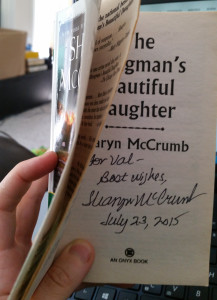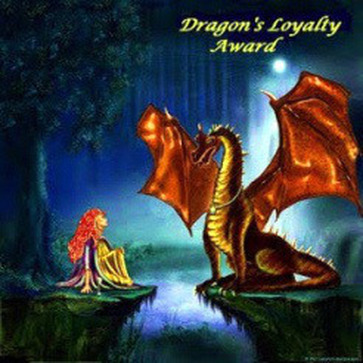Welcome to the Spot Writers. The prompt for this month is to use three of the following six words in a story: dreamy, tender, boss, week, lamp, table. This week’s contribution comes from Cathy MacKenzie, who doesn’t normally write romance, but the prompt shouts “romance.”
Give Cathy’s new Facebook page, “Granny MacKenzie’s Children’s Books,” a “like” and a comment perhaps?
Bad Table Manners
by Cathy A MacKenzie
Clint had always been the most handsome man Stacey had ever seen, and his outgoing and empathetic personality complemented his looks. She watched while he flicked hair from his forehead and adjusted his shirt over his lean frame before he sat at the bar. Her husband, Steve, would go ballistic knowing she coveted his good friend. Steve’s temper flared enough without her help.
Stacey sighed. “Come on, let’s go. Nothing much going on here.”
Carol glanced at her friend. “What do you mean? There’s lots going on here.”
“Nah, it’s boring. I’m bored.” If Stacey were single like Carol, she’d be clamouring to stay at the Thistle Downe Pub, which had been one of her favourite places before her marriage.
“It’s Clint, isn’t it?” Carol asked.
Stacey’s eyes darted in Clint’s direction before flashing at Carol. “You see right through me, don’t you?”
“Leave Steve. You’re not happy. Neither of you is happy, truth be known.”
Stacey snickered. “Steve is. He has the best of both worlds—single and married.”
“My point exactly. It’s time for you to make the break.”
“Yeah, I know. Just not sure if I’m ready for that giant jump into the wild blue yonder.”
Carol laughed. “You have such a way with words, even when you’re almost in tears.”
“Ha, ha, ha.”
“Clint likes you. He always has.”
“Carol, get real. He’s still Steve’s friend. Besides, I had my chance with Clint and I blew it.”
“You didn’t blow it. Clint blew it. He didn’t want to commit, remember? So you settled on Steve.”
“I didn’t really settle. I truly thought I was in love with Steve.”
“He’d be on your side. He’d de-friend Steve if you said the word.”
“Clint has no interest in me anymore. Maybe it’s you he’s interested in. He bought you a drink, didn’t he?” Stacey picked up Carol’s wine glass and clacked it to the table.
“He bought you a drink, too.” Carol clinked her glass against Stacey’s. “And for the record, I’m not interested in Clint, and he’s definitely not interested in me. I know that for a fact.”
Stacey examined Clint again. He truly was dreamy. Most men didn’t possess more than one or two good attributes—at least that was her experience. Her marriage and past relationships had never lived up to her expectations. In retrospect, she should have given Clint more time.
But what was she thinking? Carol was right; Clint had never wanted to commit. Had three years changed him? Was he ready to settle down?
Stacey had dated Clint for a few months after she and Steve, early in their relationship, had temporarily broken up. Perhaps it was Steve’s bad-boy reputation that had reeled her back or perhaps she hadn’t wanted to be alone. Would she have married Clint instead had he asked? Could she have been happily married to Clint for the past three years instead of unhappily married to Steve?
She wondered for the umpteenth time if Steve had proposed to knock Clint out of the picture. Clint had been annoyed when they announced their engagement and, although Clint had been Steve’s best man, he had avoided both Steve and her for a good year after the wedding. She hadn’t noticed Clint’s absence at first since Steve had always had a ready excuse as to Clint’s whereabouts, but she soon questioned it. Gradually, Clint resurfaced but the tension was unmistakeable.
Had Steve ever, really and truly, loved her? Did Clint love her? Did she still love Clint? She thought she had back then, but never received the same vibes back from him. She shrugged, tired of asking herself questions she couldn’t answer. The past was the past; the present was now, and the future lay before her. And she wanted a better future.
She silently thanked God she hadn’t conceived since it was just a matter of time until she left Steve. Perhaps tomorrow. Or the following week. Or next month.
Perhaps tonight?
Where was her gumption? She should have left long ago when Steve’s philandering became public knowledge among their friends.
She’d have to sit down, ponder her future, plot her revenge. What could she do to her husband? Retaliate with her own affairs? Slash his clothing and toss them out the apartment window? Sprinkle a poisonous powder in his coffee? Substitute toxic pills for his vitamins?
She sighed and downed her wine, slamming the glass too hard on the table, startling even herself.
Carol nudged Stacey. “I spy with my little eyes. Poof!” She raised her hands from her lap to table-height. “I see a man. The one in the blue shirt. Do you see him?” She pointed to the far side of the room.
“Yeah, I see him. With my little eyes.”
“What do you think?”
“He’s okay, I guess.”
“Okay? He’s more than okay. He’s a hunk.”
Stacey didn’t feel like arguing. “Yep, you’re right. You gonna ask him to dance?”
“I might.” While Carol watched the stranger, Stacey watched Clint, who still sat at the bar alone.
Carol elbowed Stacey and whispered, “He’s coming our way.”
“Hello, ladies.” The man’s eyes darted first to Stacey, then to Carol, and then back to Stacey. He motioned to Stacey’s drink, ignoring Carol’s empty glass. “Can I get you a refill?”
Carol’s smile disappeared.
“Sure. White wine. Oh, and my friend needs another, too,” Stacey said.
As if it was a chore, the stranger glanced at Carol before looking at her glass. “Yeah, okay. Be right back.”
“Red for me,” Carol said.
The man glared at her and then swaggered to the bar. The two women snickered.
“Can’t believe you did that,” Carol said.
“He’s a loser,” Stacey said. “Losers should pay. Besides, though he may be handsome, he’s obviously dumb and lacking in personality. Unlike Clint. And he thinks he’s king shit.”
Carol laughed. “Ah, so you’ve finally clued in about Clint. Divorce Steve. Marry Clint.”
“Carol! Who says he wants to marry me? Who says he’s even interested in me?”
“Oh, you know darn well he is.”
Their conversation stopped when the man returned with two drinks.
“I’m John. John Brown.” He nodded at Stacey. “And you are?”
“Stacey. Stacey Jones.”
“I’m Carol. Carol Smith.” Carol covered her mouth. Stacey knew Carol was trying not to laugh.
John, oblivious to the women’s joking, pulled out a chair beside Stacey. “Nice to meet you both.”
He leaned in to Stacy. “I saw you eyeing me.”
Stacey had just taken a sip of wine and, at his comment, sprayed it toward him. He seemed oblivious. “I wasn’t eyeing you. I think that was Carol.”
John glanced at Carol before returning to gaze at Stacey. He patted her hand. “I could have sworn it was you.”
Stacey removed her hand from the table. “No, I’m married. And my vows are important to me.”
John sighed. “Who cares about vows anymore? Marriage is passé. He turned to focus his attention on Carol. “What about you, Cathy?”
Carol’s face reddened. “My name is Carol.”
“You married, Cathy?”
“Divorced. And my name is Carol.”
“Imagine that. So am I. Divorced, I mean. My name’s John.” He grinned, baring perfect, pearly-whites. “We’ll make a good match then.”
Carol was saved from further conversation when Clint appeared.
“Everything okay?” Clint glanced at one woman and then the next.
“I think John here was just about to leave,” Stacey said. “Unless Carol wants him to stay?” Carol’s face flushed, and Stacey immediately regretted her words. She opened her mouth to apologize but Clint interrupted.
“Carol?”
“Sorry, John Brown, I’m tired. I’m going home. Alone.”
“I’ll take you both home,” Clint said.
The three watched John slink away. Clint helped Stacey from her chair and linked his arm into hers. “You okay?”
Stacey grinned. “I’m fine. What a louse, but aren’t all men like that at closing time?”
Carol giggled. “All except for Clint, of course.”
Clint laughed. “Yeah, I’m a perfect man though a little slow.” He gazed at Stacey. “About three years too slow.”
Carol slung her purse over her shoulder. “I have my car, Clint. I’ll see you both later. Behave, the two of you.”
Stacey feigned embarrassment. “Carol! The nerve of you.”
“Tit for tat,” Carol said.
“Not sure about the tit for tat, but Carol’s right about one thing,” Clint said. “But before we misbehave, we need to talk.”
Carol winked at Stacey before vanishing out the door.
***
The Spot Writers—Our Members:
RC Bonitz: http://www.rcbonitz.com
Val Muller: https://valmuller.com/blog/
Catherine A. MacKenzie: https://writingwicket.wordpress.com/wicker-chitter/
Deborah Marie Dera: www.deborahdera.com


 As part of this recognition, I am to share 7 interesting facts about me with my readers. I thought I’d focus on some of the fantastic parts of my childhood and background.
As part of this recognition, I am to share 7 interesting facts about me with my readers. I thought I’d focus on some of the fantastic parts of my childhood and background.



![Hang_Man's_NooseBG[1]](https://valmuller.com/wp-content/uploads/2015/07/Hang_Mans_NooseBG1-200x300.jpg)
